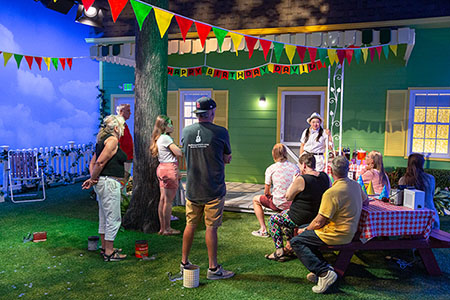(Above) Rendering of Marina Plaza, a room on the Chicago Riverwalk between State and Dearborn Streets. (Click on images to view larger versions.) Delays don’t faze Riverwalk planners
Oct. 1, 2014 – Despite delays, a stretch of Riverwalk between State Street and Clark Street will be “substantially complete” by mid-December, the Chicago Department of Transportation said on Monday. “All the cement work and all the…‘hardscape’ will be complete by then,” said Peter Scales, CDOT’s director of public affairs. “The landscaping, you can’t really put that in the middle of winter, so that’s going to have to go in early spring.” By March 2015, three blocks of the Riverwalk, from State Street west to LaSalle Street, will be open to the public. Each block will have its own style – designers refer to each block as a “room” – and its own name. Marina Plaza runs from State Street to Dearborn Street in front of Marina City, The Cove stretches from Dearborn to Clark, and River Theater sits between Clark and LaSalle. It took a Freedom of Information Act request to get this update. Scales spoke with Loop North News after ignoring requests for information and comment for several months. He acknowledged construction delays, believed to have put the project as many as eight weeks behind schedule, but said the entire project will be done on time. “We had some schedule setbacks due to the severe winter weather and the floods from the summer rain that…occur every once in a while, which has put us back several weeks,” said Scales. “By and large the entire Riverwalk improvement project remains on schedule to be complete by 2016.” Scales clarified a claim in September by Riverwalk architect Carol Ross Barney that the city has not borrowed the full $98.6 million for which it has been approved by the United States Department of Transportation. The money comes from the Transportation Infrastructure Finance Innovation Act, a program that provides federal assistance for infrastructure projects across the nation. The Chicago Riverwalk is the program’s first project. “It’s our intention to utilize the entire amount of the TIFIA loan and to borrow up to the amount of $98.6 million,” says Scales. The city gets the money back, he explains, only after it spends it. “The reimbursements come in [after] you make the expenditures…so we’ve only gotten about seven million dollars in so far to cover those costs. But that’s just the way that funding mechanism works. You make the expenses and then you essentially apply for the money.” He says to date TIFIA reimbursements have totaled exactly $6,908,963.81.
|

















